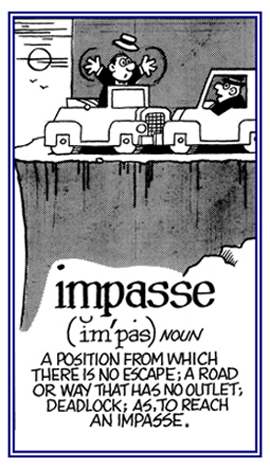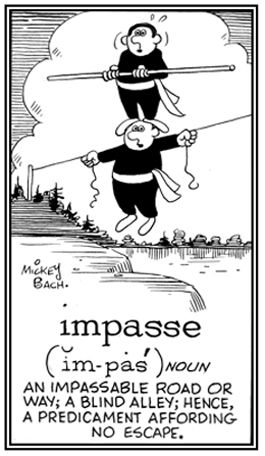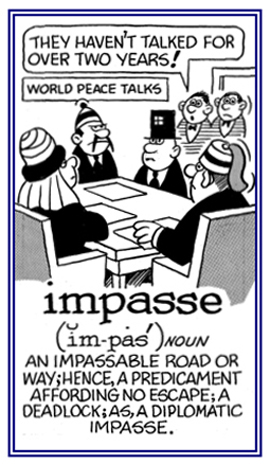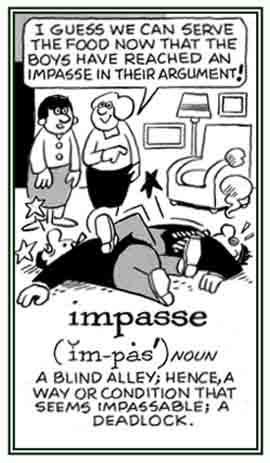pass-, pace-
(Latin: step, stepping)
apace
1. At a good or fast pace; swiftly; quickly.
2. With rapid movements.
3. Etymology: derived from Old English, an, "on"; a-, "on" + pace, "a step", from Old French pas, from Latin passus, "a step"; literally, the past participle of pandere, "to stretch (the leg), to spread out"; also related to Greek, petalon, "a leaf".
2. With rapid movements.
3. Etymology: derived from Old English, an, "on"; a-, "on" + pace, "a step", from Old French pas, from Latin passus, "a step"; literally, the past participle of pandere, "to stretch (the leg), to spread out"; also related to Greek, petalon, "a leaf".
astrocompass
A device for determining direction by celestial observation.
compass
1. A device used to determine geographic direction; usually, consisting of a magnetic needle or needles horizontally mounted or suspended and free to pivot until aligned with the earth's magnetic field.
2. Another device; such as, a radio compass or a gyrocompass, used for determining geographic directions.
3. The extent within limits; an area; a reach; a scope: "He is working within the compass of the current economic situation; so, it is not possible to increase spending for such a project."
4. A hinged instrument for drawing circles and arcs, with one leg ending in a point used as the pivot and the other ending in a pencil or pen that traces a curve as it is turned.
5. Etymology: "space, area, extent, circumference"; from Old French compas, "circle, radius, pair of compasses"; from compasser, "to go around, to measure, to divide equally"; from Vulgar Latin compassare, "to pace out"; from Latin com-, "together" + passus, "a step".
2. Another device; such as, a radio compass or a gyrocompass, used for determining geographic directions.
3. The extent within limits; an area; a reach; a scope: "He is working within the compass of the current economic situation; so, it is not possible to increase spending for such a project."
4. A hinged instrument for drawing circles and arcs, with one leg ending in a point used as the pivot and the other ending in a pencil or pen that traces a curve as it is turned.
5. Etymology: "space, area, extent, circumference"; from Old French compas, "circle, radius, pair of compasses"; from compasser, "to go around, to measure, to divide equally"; from Vulgar Latin compassare, "to pace out"; from Latin com-, "together" + passus, "a step".
compasses
electronic pacemaker, pacemaker
An electrical appliance, usually with electrodes planted in the myocardium (heart muscle), which performs the pacing functions in a diseased heart that is no longer capable of pacing itself.
Electronic pacemakers can receive power from implanted batteries, radio frequency signals, biological energy sources, etc.
encompass
encompasser
gyrocompass; gyrostatic compass
1. A compass that contains a gyroscope which is kept level so that it orients itself with "true north".
2. A north-seeking form of gyroscope used as a directional reference in navigation.
3. A navigational compass containing a gyroscope rotor, that, when adjusted for the latitude and speed of the vessel or aircraft, indicates the direction of true north along the surface of the earth or communicates this information to one or more gyro repeaters.
2. A north-seeking form of gyroscope used as a directional reference in navigation.
3. A navigational compass containing a gyroscope rotor, that, when adjusted for the latitude and speed of the vessel or aircraft, indicates the direction of true north along the surface of the earth or communicates this information to one or more gyro repeaters.
impassable (adjective), more impassable, most impassable
Impossible of being negotiated or crossed; unsurmountable: Parts of the road leading up the mountain were impassable due to a landslide obstructing the way.
The group of friends wanted to climb up to the peak of the mountain but were told that it was impassable because of heavy snow during the night.
impassable, impassible, impossible
impassable (im PAS uh buhl) (adjective)
Pertaining to something which is unable to be traveled or overcome: The severe snowstorm made the roads in the mountains impassable.
impassible (im PAS i buhl) (adjective)
Characterized as being incapable of feelings; immune to pain or suffering: Tamika's face was a masque, impassible to the suffering around her.
impossible (im PAHS i buhl) (adjective)
Unacceptable, awkward, incapable of happening: Up to 1969, it was believed that it was impossible to fly to the moon.
It was impossible to read Eric's impassible expression at the news of the efforts of his friends to cross the impassable mountain pass during the winter.
impassableness
impassably (adverb), more impassably, most impassably
Characteristizing how something is incapable of being crossed over or traveled along: After the terrible rain storm, the dirt roads were impassably muddy and full of large holes.
The hallway in Janet's home was almost immpassably blocked by her little daughter's toys, blocks, and dolls.
1. A condition in which neither progress nor advancement is possible: The mountain road was very narrow where the two cars met and this impasse posed a definite problem for the drivers because they couldn't pass each other!
2. A road with only one way in; a dead-end street; a blind alley: The Smith family lived in an impasse, and they had to turn their car around and go out in the same manner as they came in!

© ALL rights are reserved.

© ALL rights are reserved.

© ALL rights are reserved.

© ALL rights are reserved.
Go to this Word A Day Revisited Index
2. A road with only one way in; a dead-end street; a blind alley: The Smith family lived in an impasse, and they had to turn their car around and go out in the same manner as they came in!




Go to this Word A Day Revisited Index
so you can see more of Mickey Bach's cartoons.
impassible (adjective), more impassible, most impassible
1. Descriptive of someone who is incapable of suffering or pain: After hearing the very sad news of the accident, Meg was so stunned and shocked that she was quite impassible and didn't feel anything.
2. Concerning a person who is not touched or moved to passion or sympathy: Jack's sister Jill was in an impassible state of mind when she found out that her mother was involved with another man.
4. Relating to an individual who is unfeeling or not showing feeling; impassive: At the funeral James was quite impassible because he didn't know the person who had passed away.
5. Pertaining to a person who is not susceptible to, or not capable of feeling physical pain or injury; sensationless: When Ruth broke her arm, she was impassible for a moment or two because she didn't feel any throbbing or shooting pain at all!
2. Concerning a person who is not touched or moved to passion or sympathy: Jack's sister Jill was in an impassible state of mind when she found out that her mother was involved with another man.
4. Relating to an individual who is unfeeling or not showing feeling; impassive: At the funeral James was quite impassible because he didn't know the person who had passed away.
5. Pertaining to a person who is not susceptible to, or not capable of feeling physical pain or injury; sensationless: When Ruth broke her arm, she was impassible for a moment or two because she didn't feel any throbbing or shooting pain at all!
Freedom from pain, harm from external things, or suffering; impassibility: In the fantasy story that Mary was reading, the main character was said to be in a state of impassibleness, which meant that no one could injure him or that he could feel any misery or agony.
Showing page 1 out of 2 pages of 25 main-word entries or main-word-entry groups.

